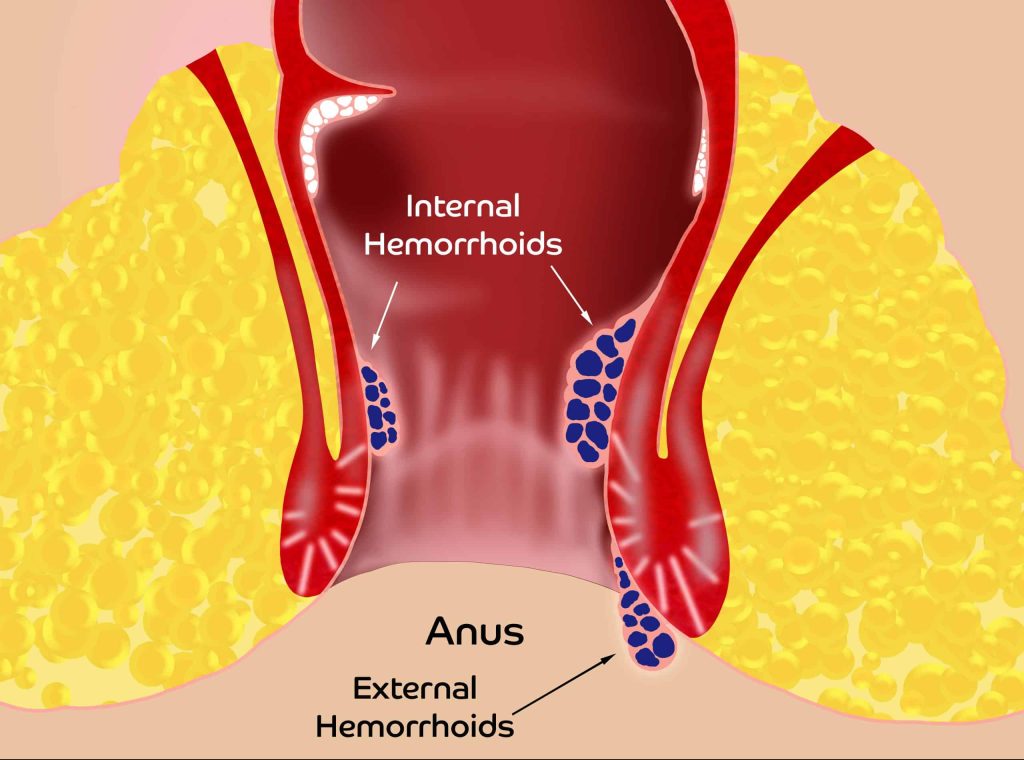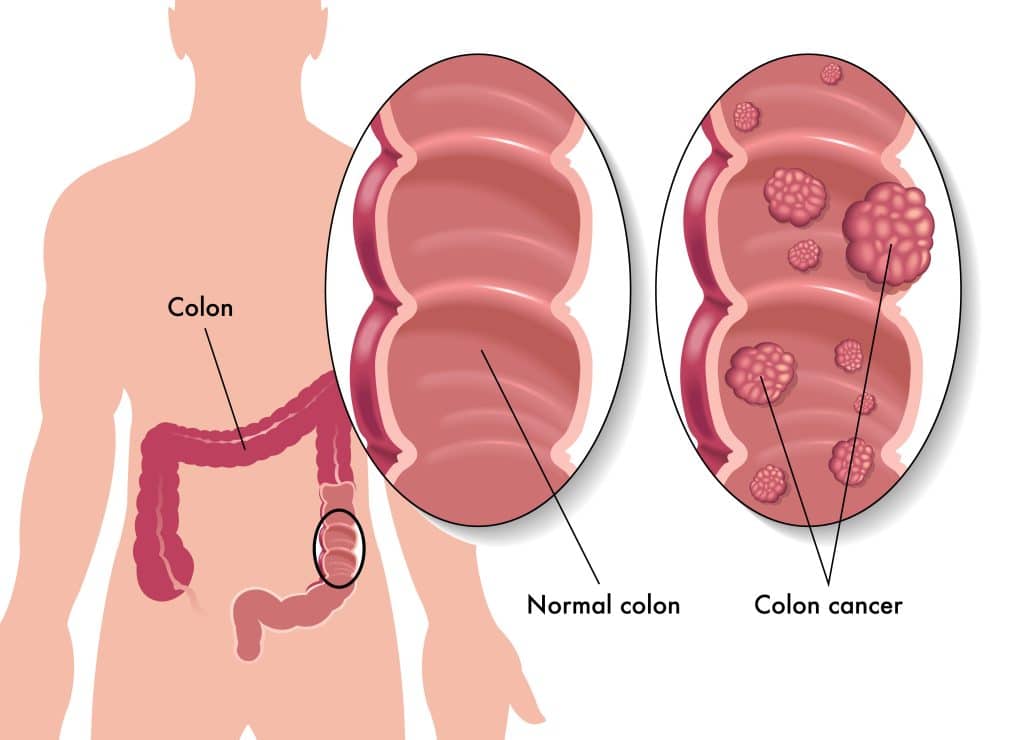When you’re feeling ill or have unexpected pain, it’s easy to hop on the web and start searching your symptoms in hopes of finding the root of your issue. WebMD and Google have made this easier than ever—and have also given countless people the fear that they have cancer. While the fear of cancer isn’t something to celebrate, the fact that researching your symptoms online can actually help prevent cancer is something to celebrate.
When someone thinks they have cancer, they’ll usually schedule an appointment with a specialist because they’re worried and want answers. In the case of rectal bleeding, they’ll schedule an appointment with a proctologist and will usually undergo a colonoscopy. Pre-cancerous polyps can be found and removed during the colonoscopy which prevents colon cancer. Therefore, this procedure can become a preventative life-saving procedure all because you saw some bright red blood with a bowel movement. What a gift.
It’s worth noting that the majority of patients who come in for a visit thinking they have cancer actually have hemorrhoids. However, many who undergo a colonoscopy for the symptom of bleeding are found to have pre-cancerous polyps which are removed at the same time. In theory, the benign rectal bleeding saved their lives. Though bright red bleeding is usually a benign symptom, hemorrhoid symptoms such as anal pressure, a lump, or bleeding, are also symptoms of rectal and anal cancer, so it is crucial to have these symptoms evaluated.
How does one know if the symptoms they are having are hemorrhoids or cancer? We’ll discuss the main symptoms of both to help you understand which one might be the culprit of your problem. That being said, making an appointment with a proctologist is imperative, even if the symptoms seem to be just hemorrhoids.
What are Hemorrhoids?

Hemorrhoids are part of our anatomy. While we all have a heart, lungs, kidneys, and a liver, we also all have hemorrhoids. In the most basic explanation, hemorrhoids are venous cushions. Although we aren’t sure exactly what they do, we know that they can cause problems sometimes.
We have three hemorrhoids inside the anus and three outside the anus. While the two types are related, the inside versus the outside hemorrhoids are very different in what symptoms they cause and how they can be treated.
Just as apples and oranges are related in that they are fruit, they are also completely different when analyzing their color and texture. In the same thread, internal and external hemorrhoids are related in that they are venous cushions but are completely different in how they cause symptoms.
Symptoms of Hemorrhoids or Cancer

Internal Hemorrhoid Symptoms
The main markers of internal hemorrhoids are bleeding and prolapse. The other symptoms that are commonly found with internal hemorrhoids are below.
- Rectal pressure and urgency to have a bowel movement
- Throbbing, aching pain or discomfort
- Hemorrhoid prolapse (the hemorrhoids come out)
- Mucous discharge
- Itching
- Bright red rectal bleeding with or without a bowel movement
- Blood drips into the bowl
- Blood streams or sprays into the bowl
- Blood on the toilet paper
- Blood in the underwear or clothing
External Hemorrhoid Symptoms
In contrast to internal hemorrhoids, external hemorrhoids rarely bleed. There are a few other indications to look for when diagnosing an external hemorrhoid.
- Thrombosis, which is when a painful anal lump occurs quickly. This is a clot of blood within the hemorrhoid. In about 5% of cases, after a thrombosis forms, it will rupture and patients will bleed.
- Swelling without clotting
- Rarely, but can occur, bleeding
Cancer Symptoms
The symptoms of cancer will vary depending on what kind of cancer you’re researching. For our comparison between hemorrhoid and cancer, we’ll be reviewing rectal, anal, and colon cancer.
Rectal cancer
Rectal cancer can cause rectal pressure, urgency, discomfort or diarrhea. Diarrhea happens when the cancer becomes so large it narrows the lumen and only liquid stool can pass. Those who may have rectal cancer may also experience maroon colored blood with bowel movements (hematochezia) or blood mixed into the stool
Anal cancer
We’ve seen patients who have had symptoms for years that go undiagnosed. In a number of these cases, when the patient finally comes in thinking they have hemorrhoids, it’s turned out to be anal cancer. Anal cancer forms a large, ulcerated, and tender mass with bright red bleeding.
Colon cancer
Colon cancer has similar symptoms to that of rectal, including:
- Abdominal pain
- Unexplained weight loss
- Change in stool caliber
- Alternating constipation and diarrhea
- Maroon colored stool (hematochezia) or black stool (melena)
As you can see, many of the symptoms of cancer and hemorrhoids overlap. These commonalities highlight the importance of being examined by a medical professional to ensure you receive the proper diagnosis and treatment plan. In my practice, any patient who has a history of bleeding is told that a colonoscopy is imperative.
Thankfully, in the majority of our patients we’ve ruled out cancer of the anus with thorough and timely examinations, including colonoscopies. As mentioned before, a colonoscopy looks for polyps, which are typically pre-cancerous and can be removed at the time of the colonoscopy. If you have any bleeding of the anus, this procedure is highly recommended to ensure you don’t have these pre-cancerous markers, which can lead to cancer itself.
It’s crucial to point out that rectal and colon cancer rates in younger Americans (younger than 50) is rising rapidly. Diagnosing rectal cancer in particular is usually delayed because the bleeding symptoms are mistaken for hemorrhoids, and a colonoscopy was not done right away. We’ve had countless young patients who have opted for a colonoscopy and were found to have a pre-cancerous polyp that we were able to remove, ultimately saving their life.
If you are experiencing any of the above symptoms, see a specialist for an evaluation. It’s possible to treat internal hemorrhoids in the office, which is a benefit for the patient, but the other—and arguably more important benefit—is having a complete evaluation to help prevent colon or rectal cancer.

